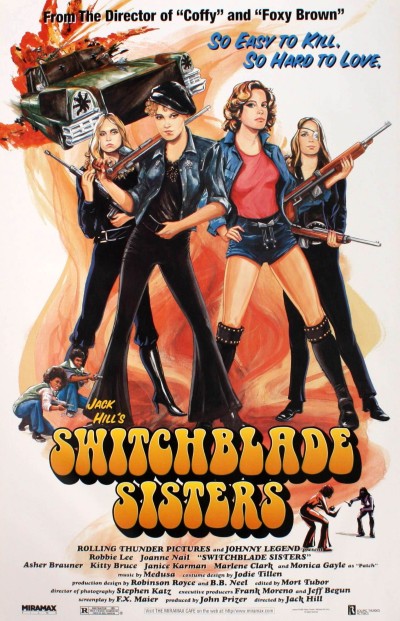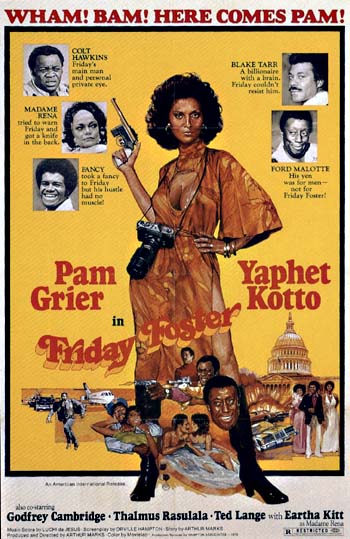★★★★
“S’funny, no-one ever calls them Switchblade Sisters.”

 The briskly-moving piece of seventies trash is much beloved by Quentin Tarantino, and I have to agree with him about its merits. While some elements haven’t stood the test of time well, in other ways, it’s well ahead of its era, and there is, literally, never a dull moment here. Initially, the teenage girl gang are the Dagger Debs, a somewhat subservient bunch to their male counterparts, the Silver Daggers, and their leader, Dominic (Brauner). He’s paired up with the Debs’ #1, Lace (Lee), but has eyes for new girl Maggie (Nail), who is soon impressing Lace with her street smarts and toughness.
The briskly-moving piece of seventies trash is much beloved by Quentin Tarantino, and I have to agree with him about its merits. While some elements haven’t stood the test of time well, in other ways, it’s well ahead of its era, and there is, literally, never a dull moment here. Initially, the teenage girl gang are the Dagger Debs, a somewhat subservient bunch to their male counterparts, the Silver Daggers, and their leader, Dominic (Brauner). He’s paired up with the Debs’ #1, Lace (Lee), but has eyes for new girl Maggie (Nail), who is soon impressing Lace with her street smarts and toughness.
That doesn’t sit well with Lace’s lieutenant, Patch (Gayle), so named because she lost an eye in an earlier incident. However, Maggie might just provide the opportunity for which Patch has been waiting. The Daggers have their own issues, having to deal with a new gang muscling in on their turf. An attempted ambush at the roller-rink goes badly wrong, with their intended targets aware of the plans, and the resulting carnage leaves a power vacuum, into which Maggie steps. She expels the men, changes the gang’s name to the Jezebels, and teams up with a revolutionary group, who can provide the weaponry she needs for revenge. Patch, however, tries to convince the gang that it was Maggie who betrayed them, having shot the leader of the enemy gang, the only other person who knows the real identity of the traitor.
Phew. Yeah, there’s a lot of stuff going on here, and in comparison to the basic plotting of many of its exploitation brethren, that’s one of the joys here. It’s also full of memorable characters, with even the minor members of the girl gang given little quirks and foibles, which help turn them from caricatures into people. In many ways, it feels like an American take on the pinky violence movies that Japan was also making in the mid-seventies, but Hill – who deserves a place in action heroine history, for his part in turning Pam Grier into a star – really amps up the female empowerment here. That’s especially true in the second half, after the Debs declare their emancipation: it’s a communal arc of independence, as they discover what they can do, culminating in a running gun-battle through the streets against their enemy. Can’t put it any better than Maggie does at the end, as she’s being led away, drenched in someone else’s blood, by the police [not much of a spoiler: crime never pays in this kind of film, fun though it might certainly be!].
“Let me give you some advice, cop. You can beat us, chain us, lock us up. But we’re gonna be back, understand? And when we do, cop, you better keep your ass off our turf, or we’ll blow it off! Ya dig? We’re Jezebels, cop – remember that name. We’ll be back!”
If that gets your juices flowing, and leaves you keen to slash the seats at the local drive-in [probably not a good idea, since it’s your own car you’ll be carving up], then this slice of prime cheese will be ripe for your platter.
Dir: Jack Hill
Star: Joanne Nail, Robbie Lee, Monica Gayle, Asher Brauner





